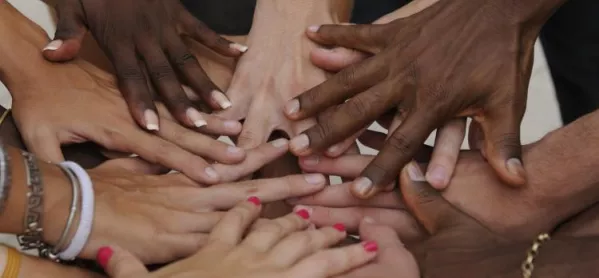Encouraging people to engage in positive contact with one another, known as "the contact hypothesis", is a proven way to reduce prejudice. Individuals, however, do not always engage in contact when given the opportunity, as noted in a recent BBC report. More needs to be done, therefore, to ensure that meaningful contact happens.
With adequate time, resources and support, schools can be places where students from different backgrounds are brought into contact with one another and where they can learn about and discuss differences. But these are big ifs: schools are busy and teachers hard-pressed.
Here are five areas that are key to promoting better community relations in diverse and non-diverse classrooms alike.
1. Interaction
There can be no substitute for actually engaging in contact with people who are different to us. Day-to-day, teachers can use targeted seating plans and cooperative learning activities in lessons to support this.
Inviting visitors into school and paying visits as a class also provide opportunities for contact. However, these must allow space and time for meaningful interactions to occur.
It is worth bearing in mind that contact need not always be in person. For example, the Generation Global project encourages young people from over 20 countries to meet each other virtually via carefully facilitated video conferences.
2. Learning about difference
Subjects like religious education and history, where the teacher has the necessary subject expertise, can increase students’ religious and cultural literacy.
In geography or history, students might research and read about different cultures or migration, sharing stories from their family or ethnic group where appropriate.
In English or drama, students might develop stories, poems or plays that are prompted by pictures, storybooks, songs, literature, films and videos that consider ethnic difference.
3. Challenging stereotypes
Teachers should include counter-stereotypical examples in their lessons in order to challenge group-based stereotypes. For example, when setting problems in maths or science, teachers can refer to female scientists or black professors.
Some teachers do find it difficult to discuss or challenge sensitive stereotypes without curriculum time and CPD. However, these topics should not be avoided and evidence suggests that learning to challenge stereotypes in one significant domain (eg, gender) can also translate to others (eg, race or religion).
4. Empathising
Supporting students to consider what it is like to stand in someone else’s shoes encourages empathy, another important component in promoting community relations. For example, students in citizenship or PSHE lessons might role-play the character of a historical figure who experienced discrimination, such as Nelson Mandela or Malala Yousafzai. Students can engage in interviewing techniques or write about how it might have felt to be that person.
5. Celebrating diversity
Embracing and celebrating group difference is much better for students than ignoring it. Try different kinds of food together, or mark festivals as a class or school. In arts subjects or primary schools, there are chances to focus in depth on celebrations of cultural difference, while all teachers can celebrate cultural diversity through wall displays, using books and moving images. Importantly, schools and teachers should be willing to discuss, embrace and celebrate difference.
Although particular subjects might be well placed to promote positive community relations, a whole school effort is needed if we are to truly build a cohesive society.
Academics from the University of Bristol joined forces with the National Association of Teachers of Religious Education (NATRE) in the Shared Space Project to explore the best ways of promoting tolerance and understanding within RE lessons. The Shared Space Project specifically looked at how social psychology research and theory can inform teaching methods to improve community relations.

